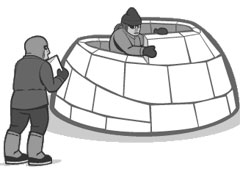If you haven’t watched it yet, Stephen Colbert’s address to the Whitehouse correspondant’s dinner is probably the best piece of journalism that you’ll see this year.
Month: April 2006
delicious Flickr
If you add a Flickr photo to your del.icio.us bookmarks, you’ll now receive a little thumbnail beside your link. Beyond the network stability, it’s one of those little benefits from Yahoo purchasing both sites.
It might not sit well with the old-school users that like the austere look, but I find the visual representation handy. I noticed it because I’ve been using my bookmarks to keep track of my comments around the web.
Luc Devroye censored
If you’re into typography, you’ve probably come across Luc Devroye’s font compendium at some point. Unfortunately, it was taken down by the McGill administration this week because he wrote about the school’s party reputation and the recent undergrad photographs in Playboy. His site is now hosted at Carleton, where cooler heads prevail. Regardless of school politics, taking down a professor’s site in the middle of exam season is not cool.
The Secret Lives of Animal Crossing
Beneather the Surface takes a look at what your Animal Crossing town says about you. I’m more like the crazy ninja that runs around. Haven’t played in awhile, so my town is probably full of weeds.
5Q with Zach Inglis
Seal Club hitting you hard with a fresh set of five questions for Zach Inglis.
Newsroom Navigator
Want to get lost in the world of information? The NYT’s cybertimes navigator has enough internet sources to give you limitless reading material. Although, it’s one of those things in desperate need of a shortened url.
The Web is Like Canada

Five and a half years later, and Joe Clark’s The Web is Like Canada still rings true — chiefly, that the web may be best defined by what it is not.
For those unfamiliar with the conundrum of Canadian identity: we have an abundance of iconic symbols, but lack a set of generic traits to pigeonhole the populace. We are everyone, and we are no one. The online world isn’t much different. It endures a constant battle of redefinition, with no real end.
Where’s the beaver?
The first generation of buzzwords are now just a distant memory — convergence, portals and push. They’re the inbred cousins that you locked in a shed and forgot about. Yet, they still managed to pop out a couple of bastard children — AJAX, community and web 2.0. Just remember that most of it doesn’t mean anything to real people:
Among the crowd that actually runs Web “properties”, there are no alternatives, a lack that masquerades as a “standard”. Their Web is Starbucks; it is the three American broadcast networks before cable TV; it is a single-newspaper town. Their Web is Pleasantville before colourization. It is mainstream in the worst possible sense.
I’m not saying there’s a problem with the stupid nature of Vocabulary 2.0, language issues are part of what makes Canada great. We just need to make sure everyone is on the same page.
Democrazy served cold
Startups are not new, neither is building to flip. A business has parallels to constructing a nation, but we need to remember that nation-building on a whim is going to give us trouble.
We old-timers wonder why the oligarchs are throwing so much money down the tubes in an effort to overthrow the existing Web. We believe in a certain kind of Internet, one that’s open to new ideas but not open to every cockamamie idea.
We’ve been down this road before, and we’ll be down it again. So, heed Joe’s words and let your voice be heard:
What I want to happen is for the wise elders of the Web, those of us who’ve been online forever and really do know better than the neophytes, to use the concepts derived from the perpetual struggle to define Canadian identity as an arrow in our quiver in efforts to shoot bad ideas out of the sky.
Blam blam. Arrowed.
Worldmapper
Information representation is always a fun exercise. Worldmapper takes it to an extreme, showing what the global map looks like under various statistical weightings. Aircraft travel vs rail travel.
Fun with money
flickrRSS 3.0.2
Fighting Blog Depression
Does reblogging a months-old post concerning a 6-page pamphlet detailing what you need to know about blog depression serve as a good kick in the teeth?

